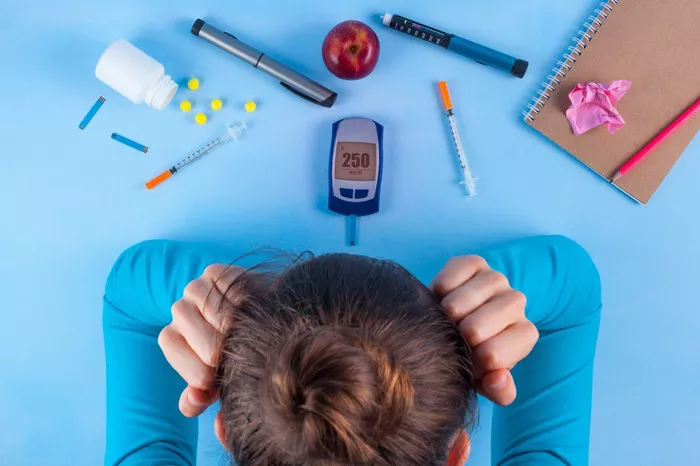Diabetes mellitus (DM) encompasses a group of metabolic disorders characterized by hyperglycemia resulting from defects in insulin secretion, insulin action, or both. This chronic condition affects millions worldwide and poses significant challenges to healthcare systems globally. Understanding the clinical features of diabetes mellitus is crucial for early diagnosis, effective management, and prevention of complications.
Types of Diabetes Mellitus
Diabetes mellitus is classified into several types, each with distinct clinical presentations and underlying mechanisms:
Type 1 Diabetes Mellitus (T1DM):
Pathophysiology: T1DM results from autoimmune destruction of pancreatic beta cells, leading to absolute insulin deficiency.
Clinical Features:
- Rapid Onset: Symptoms often develop rapidly over weeks to months.
- Polyuria and Polydipsia: Excess glucose in urine leads to increased urine output and thirst.
- Weight Loss: Despite increased appetite, weight loss occurs due to breakdown of fats and proteins.
- Ketoacidosis: Particularly common at diagnosis, presenting with nausea, vomiting, abdominal pain, and sometimes altered mental status.
Type 2 Diabetes Mellitus (T2DM):
Pathophysiology: T2DM involves insulin resistance and relative insulin deficiency.
Clinical Features:
- Insidious Onset: Symptoms may develop gradually, often unnoticed for years.
- Polyuria and Polydipsia: Similar to T1DM, but onset may be less abrupt.
- Obesity: Strongly associated with T2DM due to insulin resistance.
- Hyperglycemia: Typically detected incidentally on routine blood tests or during evaluation for other conditions.
Gestational Diabetes Mellitus (GDM):
Pathophysiology: GDM arises during pregnancy due to insulin resistance exacerbated by hormonal changes.
Clinical Features:
- Often asymptomatic; diagnosed through routine screening.
- Increased risk of macrosomia (large birth weight), neonatal hypoglycemia, and maternal complications.
Other Types:
- Monogenic Diabetes Syndromes: Result from specific genetic defects impairing beta cell function (e.g., MODY).
- Secondary Diabetes: Due to other medical conditions (e.g., pancreatitis, cystic fibrosis) or medications (e.g., corticosteroids).
Clinical Manifestations
Symptoms
Diabetes mellitus presents with a variety of symptoms, which may vary based on the type and stage of the disease:
- Polyuria: Increased urination due to osmotic diuresis from hyperglycemia.
- Polydipsia: Excessive thirst, often secondary to polyuria.
- Polyphagia: Increased hunger, especially in T1DM and early T2DM due to cellular starvation despite high blood glucose levels.
- Fatigue: Generalized weakness and tiredness, common in chronic hyperglycemia.
- Weight Changes: Unexplained weight loss in T1DM and weight gain or difficulty losing weight in T2DM.
Signs
In addition to symptoms, signs observed during clinical evaluation include:
- Hyperglycemia: Elevated blood glucose levels (fasting ≥126 mg/dL or random ≥200 mg/dL).
- Ketosis or Ketoacidosis: Presence of ketones in urine or blood, particularly in T1DM or poorly controlled T2DM.
- Hypoglycemia: Low blood glucose levels (<70 mg/dL), often related to diabetes treatment (insulin or sulfonylureas).
- Hypertension: Common comorbidity due to vascular changes associated with diabetes.
- Acanthosis Nigricans: Velvety thickening and hyperpigmentation of skin folds, associated with insulin resistance.
Complications
Untreated or poorly controlled diabetes mellitus can lead to acute and chronic complications affecting multiple organ systems:
Acute Complications:
- Diabetic Ketoacidosis (DKA): Life-threatening complication of T1DM, characterized by severe hyperglycemia, ketosis, and metabolic acidosis.
- Hyperosmolar Hyperglycemic State (HHS): Extreme hyperglycemia (>600 mg/dL) leading to dehydration, altered mental status, and potentially coma.
Chronic Complications:
- Microvascular Complications: Damage to small blood vessels, leading to diabetic retinopathy, nephropathy, and neuropathy.
- Macrovascular Complications: Accelerated atherosclerosis, increasing the risk of coronary artery disease, stroke, and peripheral vascular disease.
- Neuropathy: Peripheral and autonomic nerve damage causing sensory deficits, pain, and gastrointestinal, genitourinary, and cardiovascular dysfunction.
Diagnostic Evaluation
Diagnosis of diabetes mellitus involves clinical assessment and laboratory testing:
- Fasting Plasma Glucose (FPG): ≥126 mg/dL after fasting for at least 8 hours.
- Oral Glucose Tolerance Test (OGTT): ≥200 mg/dL at 2 hours during a standardized 75-gram glucose challenge.
- Hemoglobin A1c (HbA1c): ≥6.5%, reflecting average blood glucose levels over the preceding 2-3 months.
Additional tests may include urine analysis for ketones, C-peptide levels to assess endogenous insulin production, and screening for complications.
Management
The goals of diabetes management include achieving and maintaining near-normal blood glucose levels to prevent acute complications, delay or prevent long-term complications, and improve quality of life:
- Lifestyle Modifications: Diet, exercise, weight management, and smoking cessation.
- Pharmacological Therapy: Insulin and oral antidiabetic medications (e.g., metformin, sulfonylureas, GLP-1 receptor agonists).
- Monitoring: Regular self-monitoring of blood glucose, periodic HbA1c testing, and assessment for complications.
See also: Glucose VS. A1c What’s the Difference
Conclusion
Diabetes mellitus represents a significant global health challenge with diverse clinical manifestations and serious implications for morbidity and mortality. Early recognition of symptoms, timely diagnosis, and comprehensive management are essential to mitigate complications and improve outcomes for individuals with diabetes. Ongoing research into the pathophysiology and treatment strategies continues to evolve, offering hope for better management and potentially even prevention of this pervasive disease.
By understanding the clinical features of diabetes mellitus, healthcare providers can play a pivotal role in early intervention and patient education, thereby empowering individuals to effectively manage their condition and optimize their health outcomes.
Related topics:
How Do I Know What Type Of Diabetes I Have


























